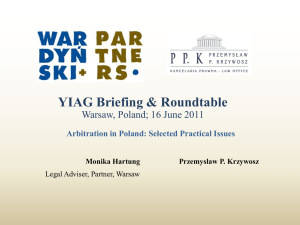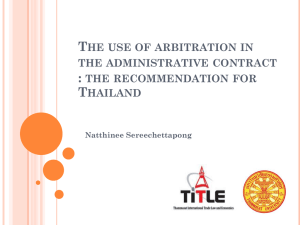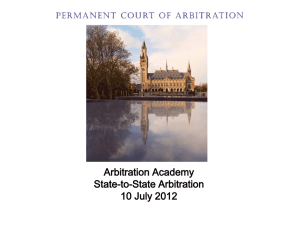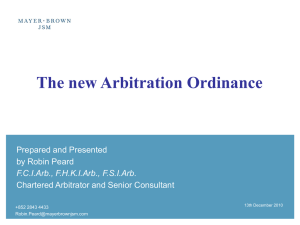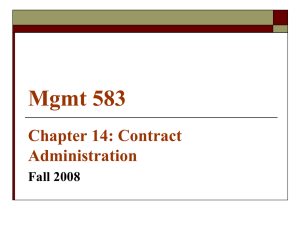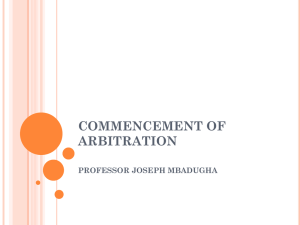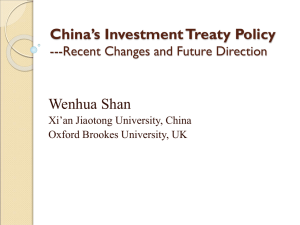(Prunier decision, history).
advertisement
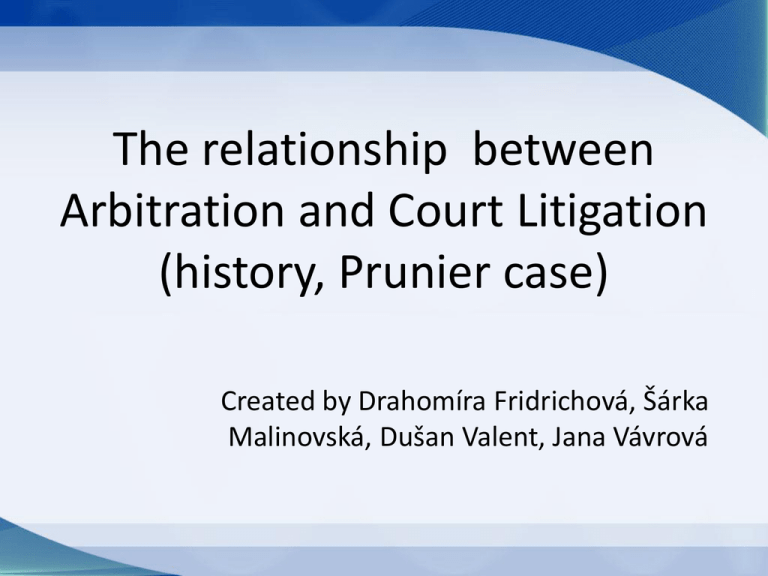
The relationship between Arbitration and Court Litigation (history, Prunier case) Created by Drahomíra Fridrichová, Šárka Malinovská, Dušan Valent, Jana Vávrová Introduction origin: lost in obscurity not clear boundaries all ages of recorded history Ancient times • Middle East • Tulpunnaya v. Killi • King Solomon • Egypt • arrangements in funerary trusts, 2 500 B.C. Ancient Greece and Rome Greece private and commercial disputes arbitration = natural process Greek Courts, lack of clear boundaries Rome compromissum, penalty Post-Classical period – pacta sunt servanda From Middle ages… guilds – mandatory arbitration What would you say, penalty clauses popular or not? influence of canonical law and Roman law arbitral deeds ...to modern era • worldwide spread of arbitration • fragmentality of arbitration in each country England arbitration older than the common law system 1698 Arbitration Act promoting commerce BUT limited by courts Civil Procedure Act (1833) improvement: arbitration agreements could not be revoked, witnesses under oath Common Law Procedure Act (1854) comprehensive arbitration statute extensive judicial review of the substance of arbitrator’s awards 1889 Arbitration Act widely adopted throughout the Commonwealth countries France • Edict of 1560 • use of mandatory arbitration for resolving commercial disputes • French Revolution • many changes arbitration as a threat • numerous restrictions Prunier case, 1843 • validity of an arbitration clause • “clause compromissoire” (in advance of a dispute) v. “compromis” • court´s holding – invalid: the names of the arbitrators not given • grounds for decision – protection of weaker parties (adhesion contract) Prunier case • mistrust of arbitration • Prunier rule = nullifying all arbitration clauses concluded before the dispute • distinct legal regime of international and internal arbitration Around Europe Austria-Hungary permanent arbitration panel by Commercial and industrial Chamber 1895 – civil procedure act responsive to arbitration Czechoslovakia –this act into national law in 1918 Germany, Belgium, Netherlands open to arbitration (unlike France) United States • earliest days of European settlement • difficulties resolving disputes • New Amsterdam (New York) • Dutch settlers: mandatory and consensual arbitration. • different development (world business center) • colonies • hostility towards arbitration until 1833 • 1925 Federal Arbitration Act • hostility fully overcome in the early 20th century • in force until today Internation Commercial Arbitration arbitration = rival of national courts → arbitration developed on international level the growth: continental Europe in the 1920s Geneva Convention & Geneva Protocol Geneva Protocol on Arbitration Clauses (1923) Geneva Convention for the Execution of Foreign Arbitral Awards (1927) New York Convention (1958) recognition and enforcement of foreign arbitral awards referral by a court to arbitration www.newyorkconvention.org UNCITRAL Model Law • United Nations Commission on International Trade Law • • • • • rules acceptable worldwide great practical value updated information on case law and enactments assistance in law reform projects seminars on uniform commercial law • zákon č.216/1994 Sb. ze dne 1. listopadu 1994 o rozhodčím řízení a o výkonu rozhodčích nález Systems of justice • delegated: legitimacy - the state justice system • parallel: separate tracks of business dispute and formal state justice • abandoned: little role of judicial institutions Today’s reality A) less supportive national legislations ▪ low practical experience ▪ potential to support v. readiness of courts B) supportive Europe, North America, parts of Asia Thank You for Your ATTENTION! Sources Bibliography: VÁRADY, Tibor; BÁRCELO, John J.; VON MEHREN, Arthur T. International Commercial Arbitration : A Transnational perspective. 3rd edition. St. Paul : Thomson/West, 2006. 931 s. ISBN 0-314-16062-0. Dezalay, Yves, and Bryant G. Garth : Dealing in Virtue. Chicago: University of Chicago Press, 1996. Ch. 10, pp. 197218. EMERSON, Frank D. History of Arbitration Practice and Law. Clevelant St. Law Review. 1970, 19, s. 155-165. WOLAVER, Earl S. . The Historical Background of Commercial Arbitration. The University of Pennsylvania Law Review. 1934 , 83, 2, s. 132-146 . Dostupný také z WWW: <http://www.jstor.org/stable/3308189?seq=3>. DE VRIES, Henry P. . International Commercial Arbitration: A Contractual Substitute for National Courts. Tulane Law Review. 1982-1983, 57, s. 42. Settlement of Disputes by Arbitration in Fifteenth-Century England. Law and History Review. 1984 , 2, s. 21-43. Dostupný také z WWW: <http://www.jstor.org/stable/743909>. JONES, William C. An Inquiry into the History of the Adjudication of Mercantile Disputes in Great Britain and the United States. The University of Chicago Law Review. 1958 , 25, 3, s. 445-464. Dostupný také z WWW: <http://www.jstor.org/stable/1598356>. SOIA, Mentschikoff. Commercial Arbitration. Columbia Law Review. 1961, 61, s. 846-870. ROZEHNALOVÁ, Nadežda. Rozhodčí řízení v medzinárodním a vnitrostátním obchodním styku. 2. Praha : Aspi, Wolter Kluwer, 2008. 388 s. ISBN 978-80-7357-324-9 Online sources: www.uncitral.com; newyorkconvention.com




